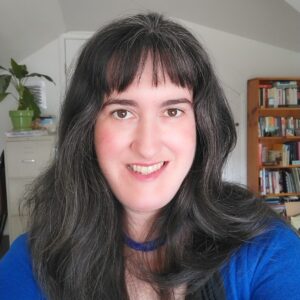 Author:
Author:
- LeAnne Laux-Bachand, she/her, Associate Teaching Professor, School of Interdisciplinary Arts and Sciences, University of Washington, Tacoma campus
Project Description
My project is a description of a first-year writing course at UW Tacoma where students research their hopes, fears, or questions about campus – or how they could make their voice heard. The curriculum includes student and faculty guest speakers, informal field trips to campus offices like the Teaching and Learning Center and the Career Development & Education, attending a campus event of their choosing, and reading our school newspaper.
Project Question
First-year students at UW Tacoma are a diverse group; many are first-generation, bilingual or multilingual, commuting, and balancing family and work obligations in addition to school. Retention to sophomore year and beyond is a vital concern. I am trying to create a course where they can better connect to campus and each other and where they can feel like their languages and experiences are valued.
Context
UW Tacoma has two first-year writing options: TCORE 101, a one-quarter option, and TWRT 120-121, a two-quarter sequence. Composition is a graduation requirement. In this course, 101 students meet in person three mornings a week.
Methods
The quarter starts with students filling out a Get-to-Know-You survey where they share with me their hopes, fears, and questions about UW Tacoma; what type of campus event they might want to attend; and what they’re interested in studying. I use this information to schedule class speakers and field trips, and at the start of each class session, I announce any events that might be of interest to them (and give them space to make their own announcements). In addition to the culminating research essay, students also write an educational narrative about a previous learning experience in school – the idea is that in order to better understand their present/future on campus, it is helpful to analyze their past.
Impact/Assessment
Students come away from the quarter having their hopes, fears, and questions better addressed and with ideas for how to make their voices heard on campus from their earliest days here. I measure the impact through course evaluations but also through other measures, such as what they learn and share in their research essays and how they answer our mid-quarter check-in, which applies John Swales’s concepts of discourse communities to our course: how well are we doing at being a discourse community, a place where they’re learning genres and vocab, receiving and giving feedback, and developing expertise as writer, students, and members of UW Tacoma?
Application
Other instructors of first-year students could gain ideas for how to incorporate this type of navigating-the-university curriculum into their courses. For example, a 100-level natural science course might do an environmental experiment on campus, or a 100-level history course might have students read old issues of the campus paper. Instructors in 200-level and upper division courses would gain a better understanding of the support first-year students need and the challenges they face, which could benefit their courses because today’s first-year student’s will hopefully be theirs next year or soon after.